Rhodes scholarship Selection Committee
Has to have a broader vision!
Evolve a more equitable approach to spotting talents from diverse backgrounds!
We need to create a bolder leadership base!

Politics, public service, a more meaningful polity and recognition of values and moral commitments must become part of national traits!
Five young Indian students win Rhodes scholarships
Cecil Rhodes (Full name: Cecil John Rhodes), 1853-1902, after whom one African state, the former Rhodesia was named, now the name is changed I believe, was one of the very successful diamond mine owner and who made huge fortunes. His younger days were undistinguished, though he managed to attend Oxford University and to take his degree at the age of 28, a very long period in Oxford tradition. However, he became successful in his African years and for what he is remembered today is his famed scholarships named after him.
He was in our present times known as a strong British imperialist and he is very lucky to have such a reputation today for having instituted his scholarships for about one hundred youngsters.
Now, the news has come that this year for the academic year 2017, five Indian students have been named and we wish the youngsters all luck and good fortune.
The point here I want to highlight is the fact that these scholarships were instituted by Rhodes in 1903 and the Rhodes’ will(see The Encyclopaedia of Oxford ,page 358) shows very clearly and emphatically that the scholarships would strengthen the perpetuation of the British empire, may be forever! So, he was clear and a fervent believer in the British Empire and that the English speaking people would work towards the establishment of justice, liberty and peace in the world.
Nothing wrong except for the so many words he had used in his will to show clearly what the Rhodes scholars would be doing in the rest of their lives.
Also, a perusal of the will shows that the scholars must have show exceptional skills, besides academic qualifications, interest in outdoor sports, he mentions cricket and football, ‘his qualities of manhood, truth, courage and devotion to duty, sympathy for the protection of the weak, besides moral force of character. These four qualities he makes emphasis. The instillation of these qualities are emphasise further to the advantage of the young Colonists as well as to the United Kingdom for the retention of the unity of the Empire’.
Now, in the changed world of today the Rhodes scholarships, the majority of about 32 to the USA,11 to Canada and, South Africa and Australia,India-3,Zimbabwe and Malaysia, Hong Kong, Singapore and British Caribbean and many other former British colonies. Even for Germany there are enough scholarships.
Now, in the case of Indian scholars who won them before, what are the careers of these gentlemen and ladies are like?
Our education and polity must have gained at least to some extent some ideals of the Rhodes original purposes.
There are many other names that are given in the write-up in the Encyclopaedia cited above. There are former Prime Ministers (of Jamaica), of Governor Generals (of Australia, even American Presidents (Clinton) Secretary of State (Dean Rusk, Nobel Prize winner and many others.
From India? None of these distinctions.
If we dig deep we fine some nameless bureaucrats only!
Why this unique distinction when we come to Indian winners, past or present?
This is what we want to point out.
Indian education and bureaucratic scene is always such that we Indians as people or a society don’t still haven’t realised that we don’t have a free society as such. Still this bureaucratic mindset characterise our public life even.
Dr.Manmohan Singh has the unique distinction of having become the most distinguished scholar who had won the distinguished academic prizes both at Cambridge and Oxford, the prizes have been elaborately constructed by his distinguished draughter-scholar who wrote a book on her father in an unnoticed book when the father became the Prime Minister of India.
What a contradiction in a person’s life!
May be India might be the only country and that too the world’s largest democracy which can have such a distinguished country to nominates Prime Minister, without contesting an elections and also a ‘leader’ who also brought a down a government through a general election in which the longest ruled historical political party, namely the Indian National Congress which could get this distinction. The party lost the elections and became the smallest Opposition party with just 44 MPs!
How to explain this political process?
Where are our Rhodes Scholars who are supposed to give leadership roles to the Indian society?
This is a dilemma that we have all have to figure out. Indian Education has to liberate itself from its own self-imposed slavery of a mindset that can’t be resolved by denying our own perpetual binding to our own history of slavery of thousands of years.
We leave the comments at this point and ask the fellow countrymen and women to ponder over the contradictions in our own national trait.
One final thought.Let the new generation of Rhodes scholars also ponder over their own future dreams and careers in the light of the history of the Indian Rhodes scholars of the past.